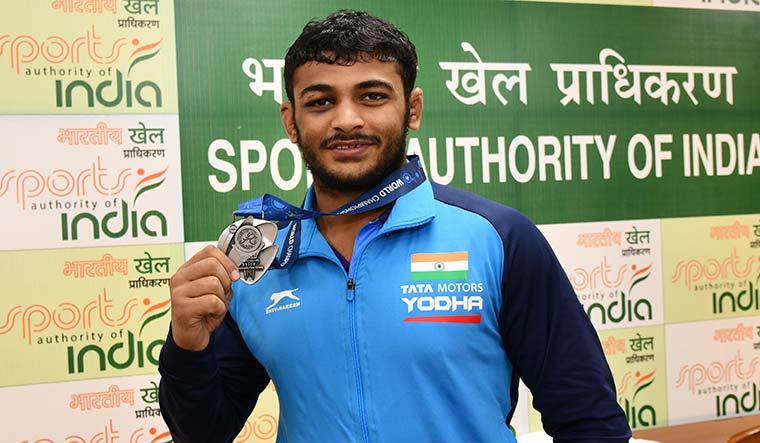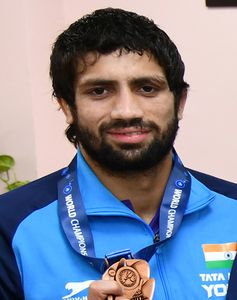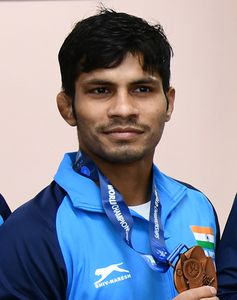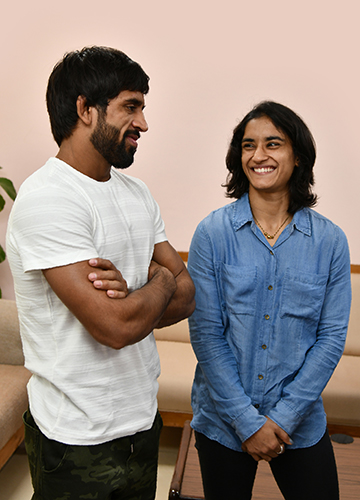THEY HAD BEEN poked in their eyes; their faces and necks bore bruises; an ankle was heavily bandaged. Their bodies and minds bore the reminders of joy and pain, of wins and losses. Back from Nur Sultan, the city of their partly realised dreams, the felicitated freestyle wrestlers looked stoic from a distance. But a closer look and the happiness of having achieved important targets at the recently concluded world wrestling championships shone bright on the faces of the five medallists.
The lone silver medallist, Deepak Punia, could not have announced his entry at the senior level any louder. The 20-year-old came close to replicating what his ‘guru’ Sushil Kumar had done nine years ago—win a gold at the championships. But an ankle injury forced him to withdraw from the final on September 22. He had to settle for a silver medal in the 86kg category. No one is complaining.
This latest wrestling sensation from Haryana won the world junior wrestling championships in August and was raring to make his mark in his first senior international event. “I was short on experience, but nevertheless, I just wanted to qualify for the Olympics with a medal,” a tired-sounding Deepak told THE WEEK.
Along with Deepak, Vinesh Phogat (53kg), Bajrang Punia (65kg), Ravi Dahiya (57kg) and Rahul Aware (61kg) created history by making the 2019 edition India’s most successful one ever—they won one silver and four bronze medals. Though gold proved elusive, the four 2020 Tokyo Olympics spots made Wrestling Federation of India president Brijbhushan Sharan Singh declare to Union Minister for Youth Affairs and Sports Kiren Rijiju that in Tokyo, wrestling alone would give India double the medals the nation won (two) at the 2016 Olympics.
This was no false bravado. London 2012 bronze medallist Yogeshwar Dutt puts it simply. “The thinking has changed. Each wrestler went with the belief that he or she would win a medal. That is why you see we returned with our best-ever performance,” he told THE WEEK. Deepak, when asked what he learnt from his first senior event promptly replied, “I learnt that I can win in Tokyo 2020.”
There are myriad emotions attached to the medals, each of them viewing theirs differently. For an ecstatic Vinesh, it is part of a journey of redemption at the Olympics. For Bajrang, the bronze was not what he went for. The top seed in the 65kg category lost the semifinal against home wrestler Daulet Niyazbekov under controversial circumstances in the tie-breaker. For another debutant, 21-year-old Ravi Dahiya from Sonepat, it is a dream come true. This victory comes after he had to ward off stiff competition in his weight category at home to make it to the worlds. For Maharashtra grappler Rahul Aware, who has overcome a strong north Indian lobby that dominates the sport, the world championships is the pinnacle. His weight category does not feature in the Olympic roster.
As for Deepak, he has not surprised anyone with his feat. After all, he trains under the watchful eyes of India’s most-accomplished wrestler, Sushil Kumar. Deepak and Ravi have both learnt the nuances of wrestling from Sushil and his battery of coaches at the akhada at the Chhatrasal Stadium in north Delhi. “Sushil pehelwanji keeps teaching us something new every time,” Deepak says of his mentor. “He was giving me tips before every bout. He had trained me very well and had sorted out my mistakes before the competition.” He came to Sushil’s akhada in 2014 from his village in Jhajjar district.
Jagmandar Singh, coach of the senior men’s team, had this to say about Deepak’s performances: “He plays without fear. He has no baggage. Sometimes that works in your favour, as more experienced wrestlers always have something at the back of their mind—some past performance or even fear of losing.”
Yogeshwar, though, has a word of caution. “He is a very positive wrestler, we should not put him under any sort of pressure. He is new and still needs to learn a lot. He should get maximum exposure. He has age on his side and can easily play three to four Olympics till he is 32-33. There is no need for [demanding] immediate results.”
Even as Deepak is getting used to being thrust into the limelight, alongside him are veterans. Vinesh Phogat, whose Rio Olympics dream ended in excruciating pain, has been on the comeback trail. It has been a long, painful road, one she will never forget. And that is why this medal and the Tokyo berth are special.
She says she had to start from scratch on her return from the career-threatening knee injury. “It will never get out of my mind—to return from the Olympics in this painful manner,” Phogat told THE WEEK. “God has given me a chance again. My hard work after it is now giving results. But getting injured repeatedly was frustrating so I decided to change my weight category.” She says that though it was tough on her mentally, the change has worked. The national coach of the women’s team, Kuldeep Malik, is pleased with the way her wrestling has evolved in the last three years. “Her wrestling is more stable now, there is maturity and understanding, which were not there earlier,” he said.
For Bajrang, the most decorated among the five, the feeling of being robbed of a victory is still raw. The semifinal loss has been a lesson of sorts for him, and his strategy, too, has been a subject of debate. “If we win medals, it means the performance is good. But I wanted to better the previous performance. Some mistakes were made by me, some by the referee,” he said. “I never take pressure. I just aim to apply my training on the mat when I go in for the bout.”
Bajrang trains with personal coach Shako Bentinidis and might have to take a hard look at his approach on the mat. As the understudy of Yogeshwar, Bajrang believes in his mentor’s mantra of outlasting the opponent with fitness and strength. “I can never forget what happened, but I will remember to factor it in when I go to the Olympics,” he said.





